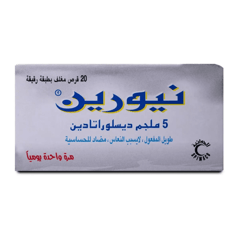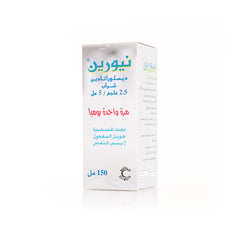Diprofos 1 Ampoule 2 Ml

Out of stock
SKU :
1009-SH037
A valid medical prescription is required to dispense this medication
for intramuscular, intra-articular, periarticular, intra-bursal, intradermal, intralesional and soft tissue injection
A valid prescription needed upon order collection
Betamethasone di-propionate/ betamethasone sodium phosphate 2 mg + 5 mg/ml (2 ml) ampoule
for intramuscular, intra-articular, periarticular, intra-bursal, intradermal, intralesional and soft tissue injection
What Betamethasone di-propionate/ betamethasone sodium phosphate is used for:
This product is used for the treatment of acute and chronic disorders that respond to corticosteroid therapy.
The use of this medicine serves as an adjunctive treatment but does not replace your initial conventional therapy.
This product is used for the following indications:
Musculoskeletal (muscles and bones) and soft tissue conditions (e.g. osteoarthritis and rheumatoid arthritis).
Allergic conditions (e.g. chronic bronchial asthma, insect bites, medication reactions, allergic bronchitis and seasonal or perennial allergies and other allergic problems).
Dermatologic conditions (e.g. Atopic dermatitis, skin allergies and hives, some types of hair loss, cystic acne and other skin problems).
For neoplastic diseases (cancer); when used as palliative treatment (to reduce pain and not to cure) of some blood cancers like, leukemias and lymphomas in adults and acute leukemia in children.
Other Conditions including adrenogenital syndrome (sex differentiation disorder); ulcerative colitis (type of an inflammatory bowel disease); regional ileitis (inflammation of the last part of your small intestine); celiac disease (autoimmune disease triggered by gluten ingestion); foot and ankle conditions; eye problems requiring injections below the eye conjunctiva; some blood and kidney problems.
Primary or secondary adrenocortical insufficiency (adrenal glands present on the kidneys do not make enough aldosterone and cortisol hormones).
This product may be given as intramuscular injection (into the muscle) in problems that are responsive to systemic corticosteroids; as injection directly into the affected soft tissues where indicated; as intra-articular (in a joint) and periarticular injection (around a joint) in joint inflammation; as intralesional injection (in a skin lesion) in multiple skin problems; and local injection in some inflammatory problems of the foot.
Do not take Betamethasone di-propionate/ betamethasone sodium phosphate:
If you are allergic to betamethasone di-propionate, betamethasone sodium phosphate, any other corticosteroid, or any of the ingredients in this medicine. Tell your doctor about the allergy and what signs you had.
If you have a systemic fungal infection.
Warnings & Precautions:
Stop the medication right away and talk to your doctor or pharmacist if you develop allergic reactions such as shortness of breath, skin rash, swelling of the face or neck, decreased blood pressure and dizziness.
Your doctor will be monitoring your electrolytes especially your potassium levels if needed (especially if you are taking medicines that may interact with this medicine).
Your doctor will be monitoring you for any excessive corticosteroid effects if you are also taking estrogen.
This medicine may affect the result of a blood test that assesses your immune system in certain medical conditions and is known as “nitroblue tetrazolium test”.
This medicine is not intended for intravenous (into the vein) or subcutaneous (below the skin) use.
Your doctor will be giving you the medicine under aseptic technique.
This medicine should be given cautiously into the muscle if you have thrombocytopenic purpura (blood does not clot normally).
Talk to your doctor before using this medicine if you have thrombocytopenic purpura.
Your doctor should avoid injecting a joint that has been previously injected.
Talk to your doctor if you experience signs of septic arthritis like, difficulty in moving your joint, an increase in pain, local swelling, fatigue and fever. Your doctor will be giving you antibiotics if needed.
Avoid overuse of your joint if it has been injected with this medicine.
Your doctor may switch you to oral therapy after long-term corticosteroid therapy depending on your case.
Your doctor may adjust the dose depending on your case and factors like age, response to therapy and your exposure to emotional or physical stress (e.g. surgery, injury or serious infection).
Your doctor may recommend monitoring you for up to one year following cessation of high-dose or long-term use of corticosteroid.
Corticosteroids may hide some symptoms of infection which makes it more difficult to detect a new infection. This medicine may also increase the risk of new infections.
Prolonged corticosteroid use may cause eye problems like possible damage to the eye nerves, posterior subcapsular cataracts (more likely to happen in children), glaucoma (increased eye pressure) and eye infections due to viruses or fungi.
Corticosteroids may increase the excretion of calcium from your body.
Average and large doses of corticosteroids may also increase your blood pressure, salt and water retention and may increase the loss of potassium.
Your doctor may recommend salt restriction from your diet in addition to potassium supplementation.
Make sure not to get vaccinated against smallpox when taking this medicine.
Make sure not to get other vaccines if you are receiving high doses of corticosteroids in order to prevent neurological side effects.
You may receive other vaccines if you are receiving replacement doses of corticosteroids (e.g. Addison disease; a disorder that causes your adrenal glands to produce low and insufficient levels of steroids).
Make sure to avoid getting exposed to measles or chickenpox when taking this medicine if you have a weak immune system.
Talk to your doctor for advice if this happens. Children are at higher risk of complications.
Talk to your doctor if you have tuberculosis. The use of corticosteroids in tuberculosis is limited to specific cases only.
Your doctor will be closely monitoring you if you have tuberculosis while you are taking corticosteroids.
In case of prolonged corticosteroids use, your doctor may also give you chemoprophylaxis (other medicines given with your corticosteroid that are used to prevent the recurrence of the disease).
If your doctor prescribes rifampin for chemoprophylaxis, he/she may adjust your corticosteroid dose if needed.
Your doctor should recommend the lowest possible dose to keep your condition controlled and will gradually decrease the dose of your medicine in case of dose reduction.
Talk to your doctor before starting this medicine if you have hypothyroidism (underactive thyroid glands) or if you have advanced liver disease.
The effect of this medicine may increase if you have hypothyroidism (underactive thyroid glands) or if you have advanced liver disease.
Talk to your doctor before starting this medicine if you have ocular herpes simplex (a type of virus in the eye) in order to prevent increased risk of corneal perforation associated with the use of this medicine in patients having ocular herpes simplex.
Corticosteroids may affect the number and motility of sperm in some patients.
This medicine may cause psychic disturbances.
Talk to your doctor if you have any emotional instability or psychotic tendencies (e.g. hallucinations).
Talk to your doctor before using this medicine if you have nonspecific ulcerative colitis (type of inflammatory bowel disease), abscess, perforation, active or latent peptic ulcer (gastrointestinal sore), infection, fresh intestinal anastomoses (surgical procedure that connects two parts of the intestine), diverticulitis (infection or inflammation of pouches in your intestines), kidney insufficiency, osteoporosis (bone fragility), high blood pressure, or myasthenia gravis.
This medicine may impact growth rates and decrease endogenous corticosteroid production in children and infants.
Your doctor should be closely monitoring the growth and development of your child in case of prolonged therapy.
Possible Side Effects:
Possible side effects include allergic reactions, fluid and electrolyte disturbances (e.g. potassium loss, sodium retention, acid-base disorders, fluid retention, congestive heart failure in susceptible patients, high blood pressure),
musculoskeletal problems (e.g. muscle weakness, muscle pain, loss of muscle mass; worsening of myasthenia symptoms in myasthenia gravis which is a disorder that causes muscle weakness,
bone weakness and fragility, fractures, joint instability and rupture of tendon which is the connective tissue that connects a bone to a muscle),
gastrointestinal side effects (e.g. ulcers, bleeding, perforation, inflammation of the pancreas, inflammation of the esophagus, abdominal distention),
skin side effects (e.g. thinning of the skin; delayed wound healing; allergic skin reactions like itching, rash and redness; facial redness; tiny red or purple or brown spots known as petechiae;
increased sweating; hives; suppressed reactions to skin tests; angioneurotic edema which is a serious condition that causes episodes of swelling in your eyes, lips, oral cavity, larynx, and gastrointestinal system),
neurologic side effects (e.g. convulsions, increased pressure in the skull, dizziness, headache),
endocrine side effects (e.g. hormonal and menstrual irregularities; decreased carbohydrate tolerance; diabetes mellitus; increased requirements of insulin or oral hypoglycemic agents in diabetics),
eye side effects (e.g. cataracts, increased eye pressure, bulging of the eye),
metabolic side effects and psychiatric side effects (e.g. euphoria, severe depression, mood swings, hallucination, personality changes, difficulty sleeping).
Other medicines and Betamethasone di-propionate/ betamethasone sodium phosphate:
Tell your doctor or pharmacist if you are taking, have recently taken or might take any other medications including prescription medicines, over the counter medicines, herbals, vitamins and supplements.
If you are taking phenytoin or phenobarbital (used to treat epilepsy and other health problems).
If you are taking rifampin (antibiotic used mainly to treat tuberculosis).
If you are taking ephedrine (stimulant)
If you are taking estrogen.
If you are using potassium-depleting diuretics (medicines that increase urination).
If you are taking cardiac glycosides (e.g. digoxin, used to treat some heart problems).
If you are taking amphotericin B (used to treat some fungal infections).
If you are taking coumarin-type anticoagulants (blood thinners e.g. warfarin).
If you are taking NSAIDs (used to reduce inflammation, fever and pain).
If you are drinking alcohol.
If you are taking somatotropin (growth hormone).
If you are taking acetylsalicylic acid (aspirin).
If you are taking antidiabetic medicines (used to treat high blood glucose levels).
How to take Betamethasone di-propionate/ betamethasone sodium phosphate:
Your doctor will be giving you your injectable doses at his/her office.
Your doctor will determine the complete dosing regimen that you need depending on your disease, the severity of the disease and how you are responding to the medicine.
Your doctor will be starting you on a starting dose that should be maintained or adjusted until you reach a satisfactory response. If you do not reach a satisfactory response to the medicine after a reasonable period of time, your doctor will make sure to stop giving you this type of therapy and will change your therapy depending on your case.
How to store Betamethasone di-propionate/ betamethasone sodium phosphate:
Keep out of the reach of children and pets
Store medication between 2 and 25 °C. Do not freeze
Your healthcare provider should shake the ampoule well before using it
Do not use beyond the expiry date mentioned on the box
Keep medication in its original pack to protect it from moisture and light
Do not dispose medication in the wastewater or household waste
| Shipping Type | Express |
|---|
Write Your Own Review
The largest selection of casino games and sports bets at 1xbet app.






